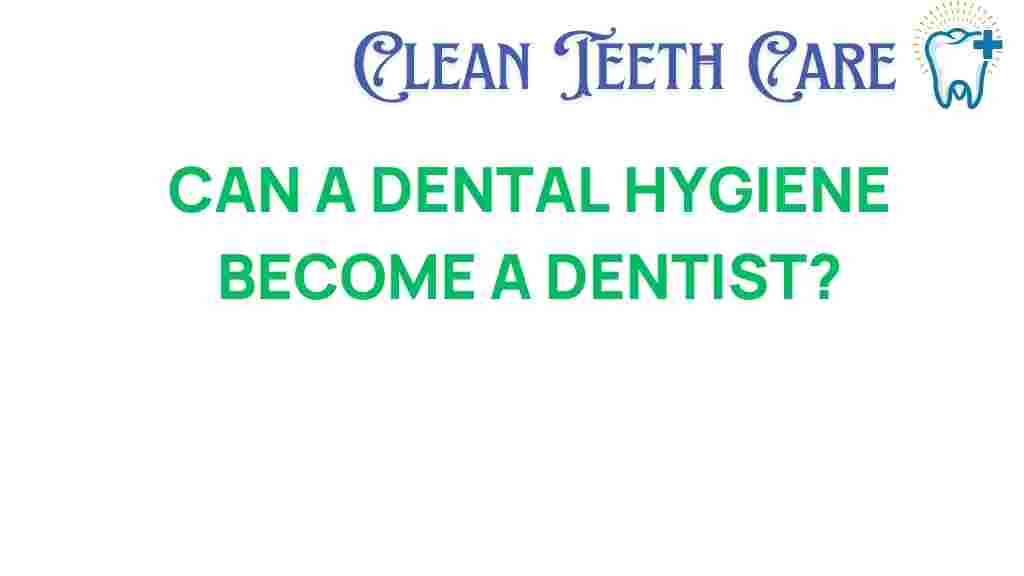Can a Dental Hygiene Career Lead to Becoming a Dentist?
Embarking on a career in dental hygiene can be a fulfilling pathway for those interested in the field of dental care. Many individuals often wonder if starting as a dental hygienist can lead to becoming a dentist. This article explores the potential career path from dental hygiene to becoming a dentist, the educational requirements involved, and the opportunities for professional growth in the healthcare sector.
Understanding the Role of Dental Hygienists
Dental hygienists play a crucial role in the healthcare system. They are responsible for a variety of tasks that contribute to patients’ oral health, including:
- Performing teeth cleanings and scaling
- Applying fluoride treatments
- Taking dental X-rays
- Educating patients on oral hygiene practices
- Assisting dentists during procedures
This profession not only allows individuals to work closely with patients but also provides a solid foundation in dental education and hands-on experience in the field.
Pathway from Dental Hygiene to Dentistry
Transitioning from a dental hygiene career to becoming a dentist is a realistic and achievable goal. Here’s a step-by-step process to guide you through this journey:
1. Start with a Dental Hygiene Program
The first step is to complete an accredited dental hygiene program. These programs typically offer:
- Associate degrees (2 years)
- Bachelor’s degrees (4 years)
- Certification programs
Upon graduation, you will need to pass a national board examination and obtain a state license to practice dental hygiene.
2. Gain Experience in the Field
Working as a dental hygienist provides invaluable experience. It allows you to:
- Understand patient care and communication
- Learn about various dental procedures
- Build relationships within the dental community
This experience can be beneficial when applying to dental school, as it demonstrates your commitment to the field and patient care.
3. Prepare for Dental School
If you decide to pursue a career as a dentist, you must prepare for dental school. This involves:
- Completing prerequisite courses in biology, chemistry, and physics
- Studying for the Dental Admission Test (DAT)
- Obtaining letters of recommendation
- Gathering relevant experience or volunteer work in dental settings
4. Attend Dental School
Dental school typically lasts four years and culminates in a Doctor of Dental Surgery (DDS) or Doctor of Dental Medicine (DMD) degree. The program includes:
- Clinical practice
- Advanced dental education
- Patient management training
During this time, you will further develop your skills and knowledge, preparing you for a successful career as a dentist.
5. Obtain Licensure
After completing dental school, you must pass the National Board Dental Examination (NBDE) and any state-specific exams to become licensed to practice as a dentist.
Benefits of Starting a Career in Dental Hygiene
Choosing to begin your career in dental hygiene offers several advantages:
- Job Opportunities: The demand for dental hygienists is high, providing stable employment options.
- Flexible Hours: Many dental hygienists work part-time, allowing for a balanced work-life schedule.
- Professional Growth: Gaining experience in dental hygiene can strengthen your application to dental school and provide networking opportunities.
- Patient Interaction: You will gain essential skills in patient care and education, which are invaluable for a future dentist.
Troubleshooting Common Concerns
While the journey from dental hygiene to dentistry is promising, it can come with challenges. Here are some common concerns and tips to overcome them:
Concern: Financial Burden of Dental School
Tip: Research scholarships, grants, and loan forgiveness programs that specifically support students pursuing dental education. Many organizations offer financial assistance to aspiring dentists.
Concern: Balancing Work and Study
Tip: Consider part-time work as a dental hygienist while enrolled in dental school. This can help maintain your income and keep you engaged in the dental field.
Concern: Rigorous Academic Requirements
Tip: Develop strong study habits and seek tutoring or study groups to help manage the challenging coursework in dental school.
The Future of Dental Careers
The field of dentistry is constantly evolving, with advancements in technology and patient care. As a result, both dental hygienists and dentists will continue to see an increase in job opportunities. According to the U.S. Bureau of Labor Statistics, employment for dental hygienists is expected to grow by 11% from 2020 to 2030, and dentists will also see a steady demand due to the aging population.
Both professions are essential in promoting oral health and contributing to overall healthcare. Pursuing a career in dental hygiene can serve as a stepping stone to a rewarding future in dentistry.
Conclusion
In conclusion, starting a career in dental hygiene can indeed lead to becoming a dentist. The pathway involves gaining valuable experience, completing necessary education, and preparing for dental school. With the growing demand for both dental hygienists and dentists, this career path offers numerous job opportunities, professional growth, and a chance to make a significant impact in the field of dental care.
If you are passionate about oral health and considering a career in healthcare, explore the possibilities that a foundation in dental hygiene can provide. For more information about dental education programs, visit this resource. You can also learn about the various career paths in healthcare by checking out this informative article.
This article is in the category Products and created by CleanTeethCare Team
